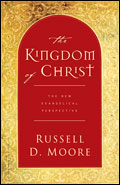
Over the last 3-4 years I have been really mulling over the whole Kingdom of God theology. As I am visiting the Gospels again and again, I am confronted with the significance and the importance of how the Kingdom theology is interlaced with a lot of Jesus’ teachings.
Not too long ago, I had some stimulating conversations on this book by Russell D. Moore with some of my close friends. His book is probably one of the best books I have read that clearly articulates (albeit at times it is heavy in seminary level discussions) the Kingdom theology both from a historical point of view, as well as from a present emerging discussion from various theological camps.
This book is thoroughly researched. I have never read a book that had one third of its pages filled with endnotes. I guess only a dean of the School of Theology in the Southern Baptist Theological Seminary would do something like this. But it was some incredible reading – the cross references to other sources were invaluable!
The thing that struck me was how there is a movement towards a consensus on the evangelical perspective on the Kingdom of God discussion. It has always been accepted that where you fall in the theological persuasion (Dispensation theology or Covenantal theology), it will affect how you view your role as a Christ-follower or the Church’s role in culture engagement – ranging from politics or social issues.
Moore argues that over the years, the lack of consensus on the Kingdom of God theology within the evangelical circles has weakened and fractured the Church’s ability to engage the culture. I love how Moore pinpoints three areas of contention, which affect how a person sees their calling to engage the culture: Eschatology, Soteriology, and Ecclesiology.
Instead of allowing the differences to separate the Body of Christ, Moore suggests that we need an “emerging evangelical consensus.” He believes that as the “dispensationalist evangelical” and the “covenantalist evangelical” see some of the biblical truths in each other’s perspective, they will come together to make a difference in our generation.
Moore writes, “With the various traditions reexamining their theological presuppositions, a remarkable coalescence has occurred, as evangelical theology has arrived at a Kingdom model that synthesizes these biblical truths, seeing them in harmony with one another… The consensus emerged from the long process of exegetical exploration and theological reflection.” He continues and states that this is a viewpoint which “holds in tension the Kingdom realities of a church truly militant but not yet visibly triumphant. This has clear implications for a theology of evangelical engagement – a theology that has both reachable goals and defined limitations.”
This book has been a catalyst for further thought in the whole Transformasphere Movement. As I try to prepare our people to engage in the various spheres of society, I am realizing that a stronger foundational teaching on the Kingdom of God will be an important piece to the greater vision of transformation.



